While day-to-day life at Carleton is primarily orchestrated by the administration, students also work behind the scenes to bring positive change to Carleton. One of these students is Jancyn Appel, Carleton’s student body president.
Appel has firsthand experience with the inner workings of Carleton. In her first year of college, she worked in former-President Steven Poskanzer’s office, giving her an opportunity to observe the daily tasks of the College Presidency. She has worked for admissions as a summer fellow and served on the Carleton Student Association Senate starting in spring of 2020 as the Class of 2023 Representative.
Appel described her decision to run for an executive role: “I was thinking, ok, I’ve been a really vocal voting member for three years. I’m one of the more vocal people in meetings, people are clearly taking stock in what I have to say, maybe that’s the time to work in a much more executive capacity.”
Appel ran for a variety of reasons, but said a main motivator was “leaving the jersey better than I found it,” a concept she also applies in her role as a captain on the varsity volleyball team. She sees her current role as an unbelievable resource that allows her to both delegate tasks effectively and stay up to date with the various corners of campus.
After a successful spring election cycle, CSA is without any major vacancies. “We have such a diverse group of people in the senate that I’m able to really tap into a lot of information,” Appel said in regard to the current makeup of the CSA Senate.”We have a hyper-representative senate in the sense that it is so diverse that it is unrepresentative of Carleton as a whole. We’re majority minority in basically every category you can think of.”
This level of representation is what gives Appel such strong insight into the needs of the student body: “We have people of so many different majors and clubs and pockets on campus aside from those identity perspectives that we are able to tap into a lot of different places because we have so many people coming in.”
Not only does she want to make the 2022-23 academic year a success, but she sees influence beyond the scope of her presidency as essential to her self-evaluation process. As a political science major focused on pursuing a career in public interest law, she focuses heavily on the communication aspect of her role as president. She laughed as she described her job as “really just a lot of meetings.”Appel deals with a large budget collected through the Student Activity Fee and works as a “conduit of both information and desires between students and the administration.” This means that she spends her days meeting with the Advisory Committee of Student Life, the Dean of Students, the President and the Board of Trustees. On a campus where the high-level administration is oftentimes unseen, Jancyn gets a foot in the door for students.
One of the things she likes most about Carleton is “the ability to enact change if you choose to.” Through her executive role, Appel sees herself as able to empower her fellow CSA members to succeed both on their individual passion projects and in regard to the larger goal of “getting students through the year.” To achieve that goal , Appel focuses on allocating funding for student needs such as textbooks, funding for emergency costs, indirect costs and other classroom fees. This is part of an effort to make Carleton accessible beyond what financial aid is willing to cover.
Despite her optimism about instituting change at Carleton, she still faces numerous challenges, especially around time constraints. She mentioned the difficulty of executing some of these reforms in an “unforgiving” 10-week term, where even if she can solve an issue such as textbook funding during week three, it’s already too late. Appel meets with someone every day about textbook fees, saying “things take time but time doesn’t exist at Carleton, so moving faster sooner I think is gonna be our big priority.”
Beyond allocating funding, Appel wants students to have a direct pipeline to committees that directly impact them. One such committee is the Inclusion, Diversity and Equity (IDE) Committee, who she meets with from time to time during the process of selecting a chief diversity officer for Carleton.
“I think my biggest priority for this year is maintaining a positive relationship and better communication between the college council and the general campus, because the college council really does make a lot of those big decisions, same with the Advisory Committee of Student Life,” Appel said.
When asked about whether CSA is more reactive to the needs of the student body or proactive toward future issues, Appel saw both as key. She enjoys her ability to be proactive with things such as accurate, efficient budgeting as well as ensuring graduation requirements make sense for students. However, she says that at the end of the day, while she’d love all of her goals to come to fruition, she feels their reactive legislation based on student feedback “tends to serve the students more directly than what is assumed people would want.”
Appel is committed to her role as a leader on campus. She wishes to meaningfully increase student engagement and use her platform to increase the potency of student feedback. She encourages students to come to CSA Senate meetings and wants students to feel like the CSA Senate agenda is accessible for their needs. Looking at the year ahead, she is confident that she can be proactive in supporting students ahead of time while staying light on her feet and responding quickly to challenges facing the student body.










